Hospitality Consumer Behaviour and Insight Assignment Sample
VerifiedAdded on 2021/02/20
|9
|2641
|307
AI Summary
Contribute Materials
Your contribution can guide someone’s learning journey. Share your
documents today.
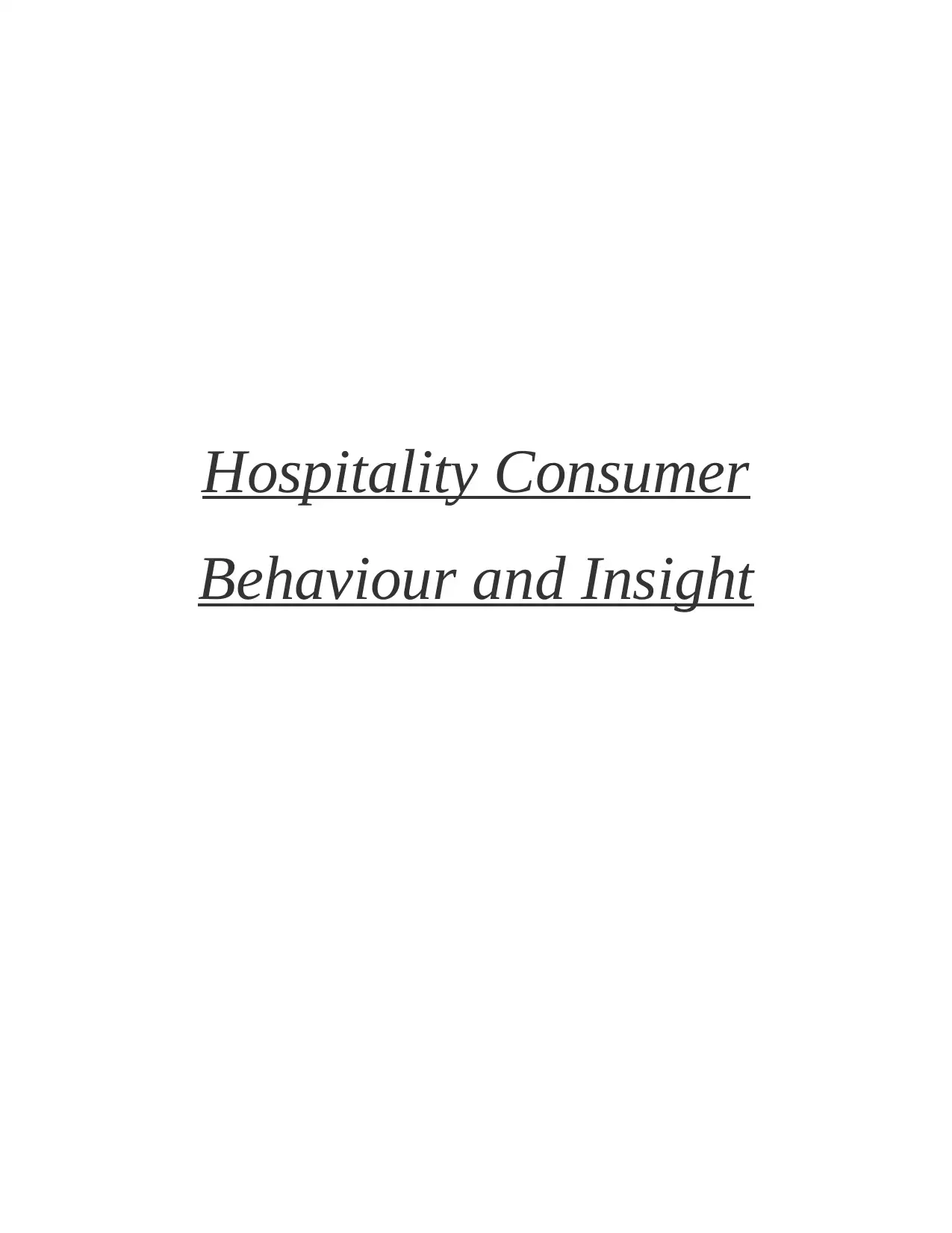
Hospitality Consumer
Behaviour and Insight
Behaviour and Insight
Secure Best Marks with AI Grader
Need help grading? Try our AI Grader for instant feedback on your assignments.
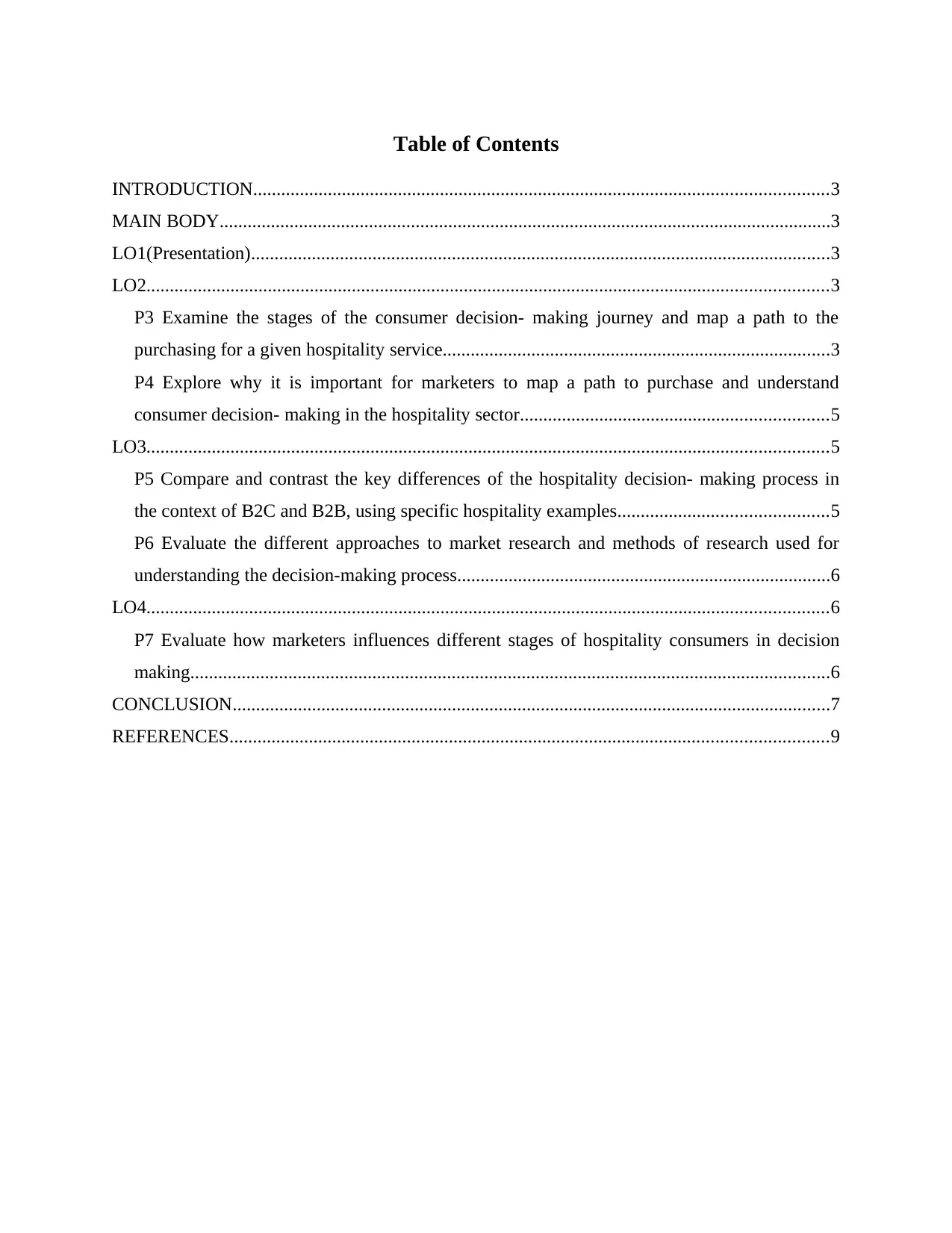
Table of Contents
INTRODUCTION...........................................................................................................................3
MAIN BODY...................................................................................................................................3
LO1(Presentation)............................................................................................................................3
LO2..................................................................................................................................................3
P3 Examine the stages of the consumer decision- making journey and map a path to the
purchasing for a given hospitality service...................................................................................3
P4 Explore why it is important for marketers to map a path to purchase and understand
consumer decision- making in the hospitality sector..................................................................5
LO3..................................................................................................................................................5
P5 Compare and contrast the key differences of the hospitality decision- making process in
the context of B2C and B2B, using specific hospitality examples.............................................5
P6 Evaluate the different approaches to market research and methods of research used for
understanding the decision-making process................................................................................6
LO4..................................................................................................................................................6
P7 Evaluate how marketers influences different stages of hospitality consumers in decision
making.........................................................................................................................................6
CONCLUSION................................................................................................................................7
REFERENCES................................................................................................................................9
INTRODUCTION...........................................................................................................................3
MAIN BODY...................................................................................................................................3
LO1(Presentation)............................................................................................................................3
LO2..................................................................................................................................................3
P3 Examine the stages of the consumer decision- making journey and map a path to the
purchasing for a given hospitality service...................................................................................3
P4 Explore why it is important for marketers to map a path to purchase and understand
consumer decision- making in the hospitality sector..................................................................5
LO3..................................................................................................................................................5
P5 Compare and contrast the key differences of the hospitality decision- making process in
the context of B2C and B2B, using specific hospitality examples.............................................5
P6 Evaluate the different approaches to market research and methods of research used for
understanding the decision-making process................................................................................6
LO4..................................................................................................................................................6
P7 Evaluate how marketers influences different stages of hospitality consumers in decision
making.........................................................................................................................................6
CONCLUSION................................................................................................................................7
REFERENCES................................................................................................................................9
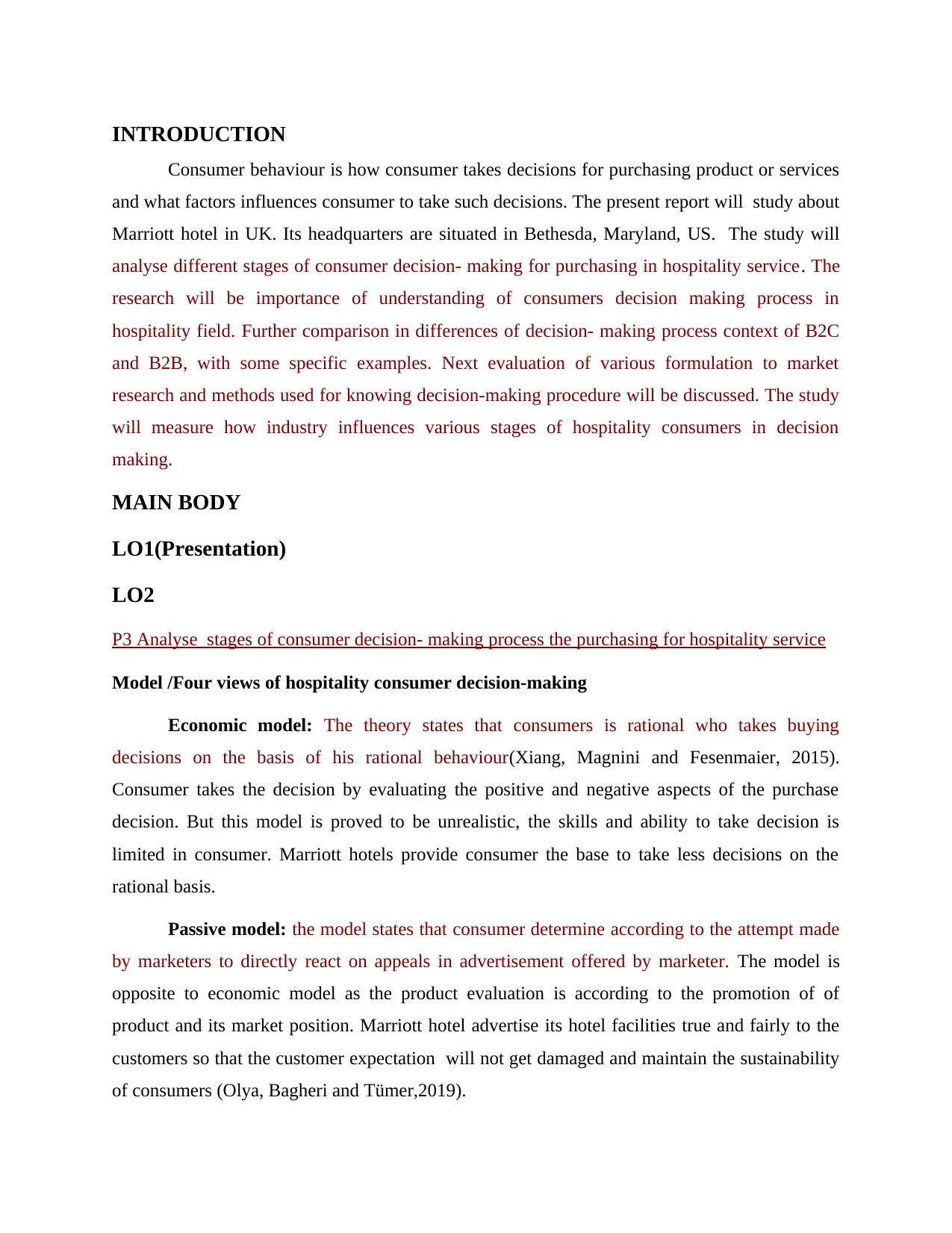
INTRODUCTION
Consumer behaviour is how consumer takes decisions for purchasing product or services
and what factors influences consumer to take such decisions. The present report will study about
Marriott hotel in UK. Its headquarters are situated in Bethesda, Maryland, US. The study will
analyse different stages of consumer decision- making for purchasing in hospitality service. The
research will be importance of understanding of consumers decision making process in
hospitality field. Further comparison in differences of decision- making process context of B2C
and B2B, with some specific examples. Next evaluation of various formulation to market
research and methods used for knowing decision-making procedure will be discussed. The study
will measure how industry influences various stages of hospitality consumers in decision
making.
MAIN BODY
LO1(Presentation)
LO2
P3 Analyse stages of consumer decision- making process the purchasing for hospitality service
Model /Four views of hospitality consumer decision-making
Economic model: The theory states that consumers is rational who takes buying
decisions on the basis of his rational behaviour(Xiang, Magnini and Fesenmaier, 2015).
Consumer takes the decision by evaluating the positive and negative aspects of the purchase
decision. But this model is proved to be unrealistic, the skills and ability to take decision is
limited in consumer. Marriott hotels provide consumer the base to take less decisions on the
rational basis.
Passive model: the model states that consumer determine according to the attempt made
by marketers to directly react on appeals in advertisement offered by marketer. The model is
opposite to economic model as the product evaluation is according to the promotion of of
product and its market position. Marriott hotel advertise its hotel facilities true and fairly to the
customers so that the customer expectation will not get damaged and maintain the sustainability
of consumers (Olya, Bagheri and Tümer,2019).
Consumer behaviour is how consumer takes decisions for purchasing product or services
and what factors influences consumer to take such decisions. The present report will study about
Marriott hotel in UK. Its headquarters are situated in Bethesda, Maryland, US. The study will
analyse different stages of consumer decision- making for purchasing in hospitality service. The
research will be importance of understanding of consumers decision making process in
hospitality field. Further comparison in differences of decision- making process context of B2C
and B2B, with some specific examples. Next evaluation of various formulation to market
research and methods used for knowing decision-making procedure will be discussed. The study
will measure how industry influences various stages of hospitality consumers in decision
making.
MAIN BODY
LO1(Presentation)
LO2
P3 Analyse stages of consumer decision- making process the purchasing for hospitality service
Model /Four views of hospitality consumer decision-making
Economic model: The theory states that consumers is rational who takes buying
decisions on the basis of his rational behaviour(Xiang, Magnini and Fesenmaier, 2015).
Consumer takes the decision by evaluating the positive and negative aspects of the purchase
decision. But this model is proved to be unrealistic, the skills and ability to take decision is
limited in consumer. Marriott hotels provide consumer the base to take less decisions on the
rational basis.
Passive model: the model states that consumer determine according to the attempt made
by marketers to directly react on appeals in advertisement offered by marketer. The model is
opposite to economic model as the product evaluation is according to the promotion of of
product and its market position. Marriott hotel advertise its hotel facilities true and fairly to the
customers so that the customer expectation will not get damaged and maintain the sustainability
of consumers (Olya, Bagheri and Tümer,2019).
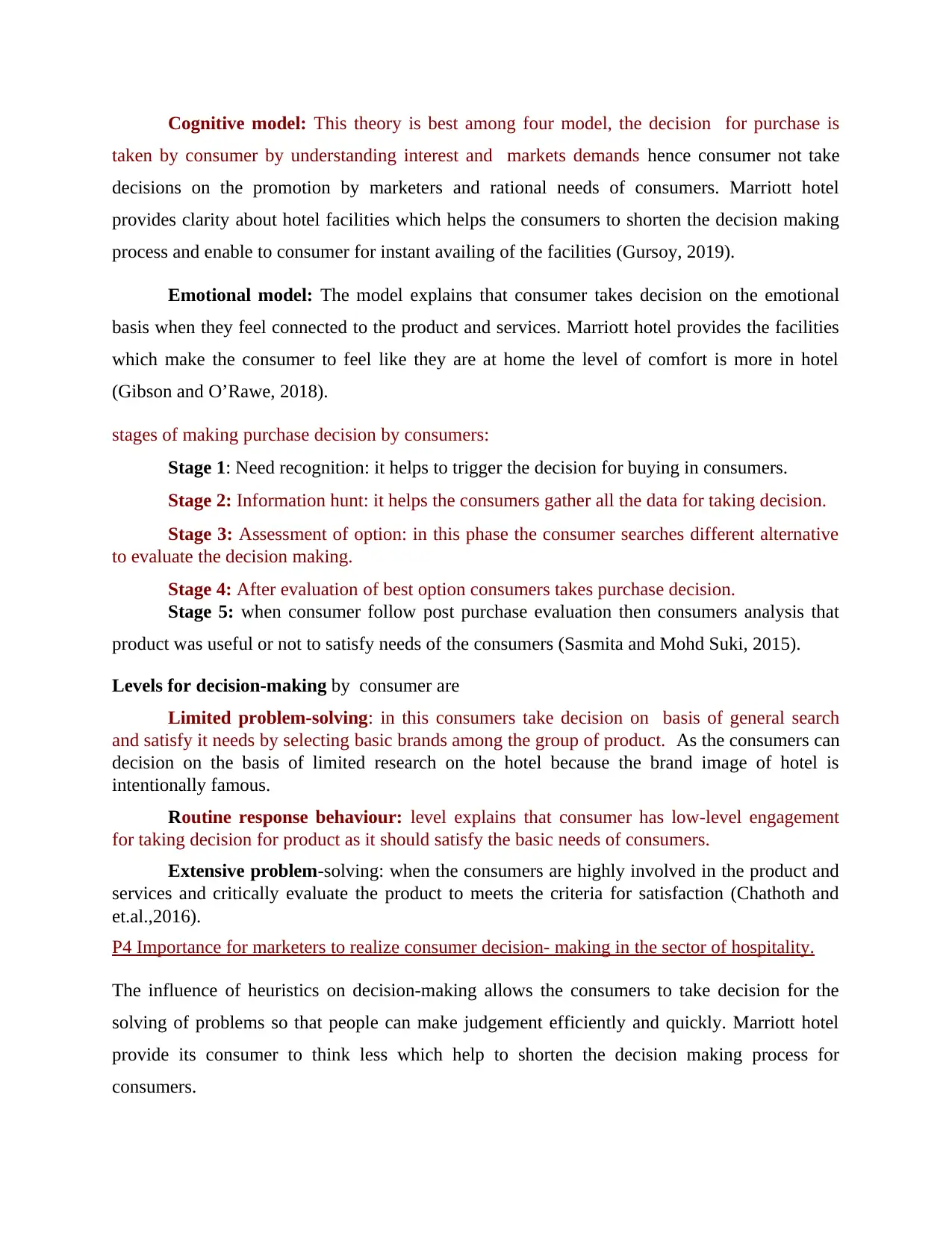
Cognitive model: This theory is best among four model, the decision for purchase is
taken by consumer by understanding interest and markets demands hence consumer not take
decisions on the promotion by marketers and rational needs of consumers. Marriott hotel
provides clarity about hotel facilities which helps the consumers to shorten the decision making
process and enable to consumer for instant availing of the facilities (Gursoy, 2019).
Emotional model: The model explains that consumer takes decision on the emotional
basis when they feel connected to the product and services. Marriott hotel provides the facilities
which make the consumer to feel like they are at home the level of comfort is more in hotel
(Gibson and O’Rawe, 2018).
stages of making purchase decision by consumers:
Stage 1: Need recognition: it helps to trigger the decision for buying in consumers.
Stage 2: Information hunt: it helps the consumers gather all the data for taking decision.
Stage 3: Assessment of option: in this phase the consumer searches different alternative
to evaluate the decision making.
Stage 4: After evaluation of best option consumers takes purchase decision.
Stage 5: when consumer follow post purchase evaluation then consumers analysis that
product was useful or not to satisfy needs of the consumers (Sasmita and Mohd Suki, 2015).
Levels for decision-making by consumer are
Limited problem-solving: in this consumers take decision on basis of general search
and satisfy it needs by selecting basic brands among the group of product. As the consumers can
decision on the basis of limited research on the hotel because the brand image of hotel is
intentionally famous.
Routine response behaviour: level explains that consumer has low-level engagement
for taking decision for product as it should satisfy the basic needs of consumers.
Extensive problem-solving: when the consumers are highly involved in the product and
services and critically evaluate the product to meets the criteria for satisfaction (Chathoth and
et.al.,2016).
P4 Importance for marketers to realize consumer decision- making in the sector of hospitality.
The influence of heuristics on decision-making allows the consumers to take decision for the
solving of problems so that people can make judgement efficiently and quickly. Marriott hotel
provide its consumer to think less which help to shorten the decision making process for
consumers.
taken by consumer by understanding interest and markets demands hence consumer not take
decisions on the promotion by marketers and rational needs of consumers. Marriott hotel
provides clarity about hotel facilities which helps the consumers to shorten the decision making
process and enable to consumer for instant availing of the facilities (Gursoy, 2019).
Emotional model: The model explains that consumer takes decision on the emotional
basis when they feel connected to the product and services. Marriott hotel provides the facilities
which make the consumer to feel like they are at home the level of comfort is more in hotel
(Gibson and O’Rawe, 2018).
stages of making purchase decision by consumers:
Stage 1: Need recognition: it helps to trigger the decision for buying in consumers.
Stage 2: Information hunt: it helps the consumers gather all the data for taking decision.
Stage 3: Assessment of option: in this phase the consumer searches different alternative
to evaluate the decision making.
Stage 4: After evaluation of best option consumers takes purchase decision.
Stage 5: when consumer follow post purchase evaluation then consumers analysis that
product was useful or not to satisfy needs of the consumers (Sasmita and Mohd Suki, 2015).
Levels for decision-making by consumer are
Limited problem-solving: in this consumers take decision on basis of general search
and satisfy it needs by selecting basic brands among the group of product. As the consumers can
decision on the basis of limited research on the hotel because the brand image of hotel is
intentionally famous.
Routine response behaviour: level explains that consumer has low-level engagement
for taking decision for product as it should satisfy the basic needs of consumers.
Extensive problem-solving: when the consumers are highly involved in the product and
services and critically evaluate the product to meets the criteria for satisfaction (Chathoth and
et.al.,2016).
P4 Importance for marketers to realize consumer decision- making in the sector of hospitality.
The influence of heuristics on decision-making allows the consumers to take decision for the
solving of problems so that people can make judgement efficiently and quickly. Marriott hotel
provide its consumer to think less which help to shorten the decision making process for
consumers.
Secure Best Marks with AI Grader
Need help grading? Try our AI Grader for instant feedback on your assignments.
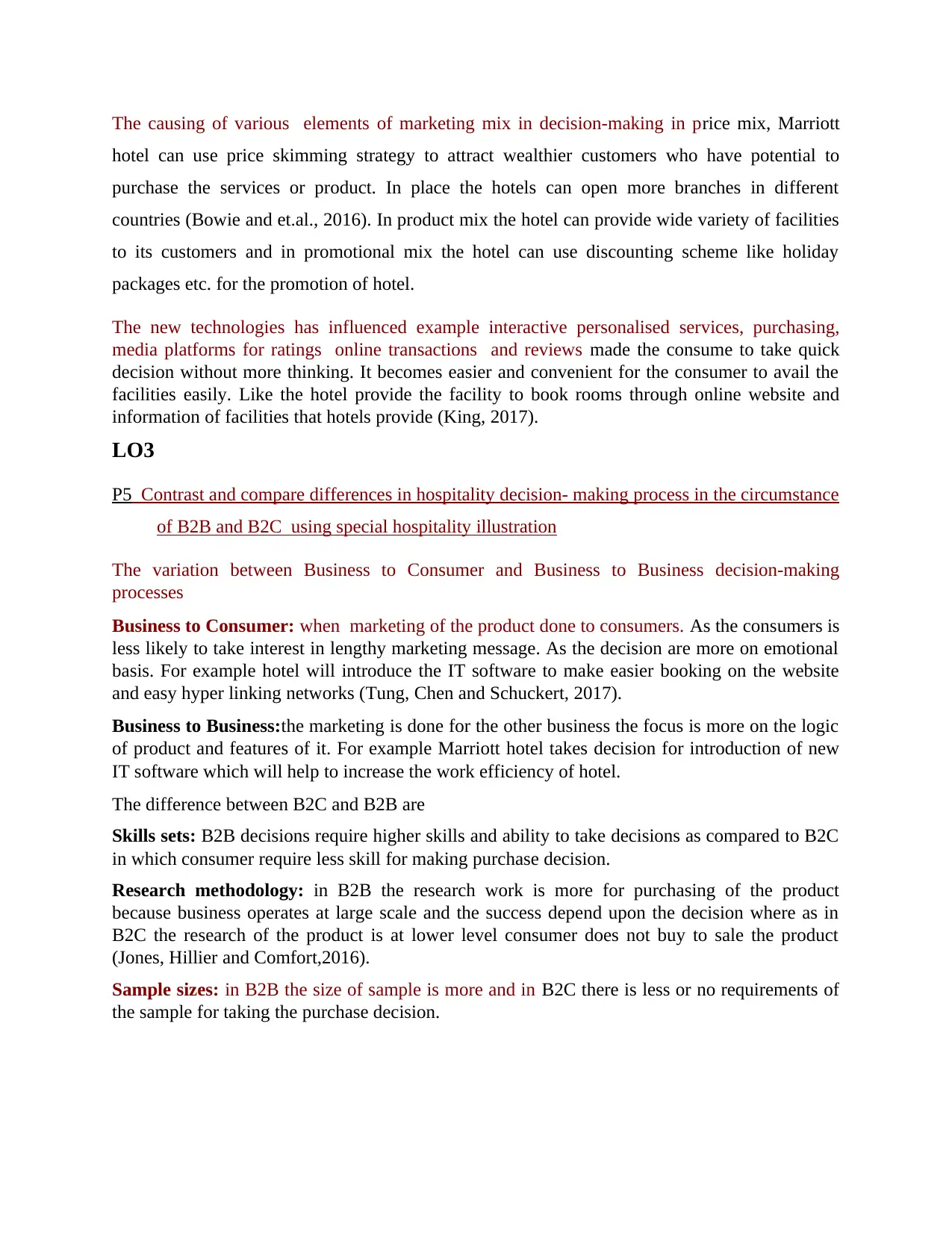
The causing of various elements of marketing mix in decision-making in price mix, Marriott
hotel can use price skimming strategy to attract wealthier customers who have potential to
purchase the services or product. In place the hotels can open more branches in different
countries (Bowie and et.al., 2016). In product mix the hotel can provide wide variety of facilities
to its customers and in promotional mix the hotel can use discounting scheme like holiday
packages etc. for the promotion of hotel.
The new technologies has influenced example interactive personalised services, purchasing,
media platforms for ratings online transactions and reviews made the consume to take quick
decision without more thinking. It becomes easier and convenient for the consumer to avail the
facilities easily. Like the hotel provide the facility to book rooms through online website and
information of facilities that hotels provide (King, 2017).
LO3
P5 Contrast and compare differences in hospitality decision- making process in the circumstance
of B2B and B2C using special hospitality illustration
The variation between Business to Consumer and Business to Business decision-making
processes
Business to Consumer: when marketing of the product done to consumers. As the consumers is
less likely to take interest in lengthy marketing message. As the decision are more on emotional
basis. For example hotel will introduce the IT software to make easier booking on the website
and easy hyper linking networks (Tung, Chen and Schuckert, 2017).
Business to Business:the marketing is done for the other business the focus is more on the logic
of product and features of it. For example Marriott hotel takes decision for introduction of new
IT software which will help to increase the work efficiency of hotel.
The difference between B2C and B2B are
Skills sets: B2B decisions require higher skills and ability to take decisions as compared to B2C
in which consumer require less skill for making purchase decision.
Research methodology: in B2B the research work is more for purchasing of the product
because business operates at large scale and the success depend upon the decision where as in
B2C the research of the product is at lower level consumer does not buy to sale the product
(Jones, Hillier and Comfort,2016).
Sample sizes: in B2B the size of sample is more and in B2C there is less or no requirements of
the sample for taking the purchase decision.
hotel can use price skimming strategy to attract wealthier customers who have potential to
purchase the services or product. In place the hotels can open more branches in different
countries (Bowie and et.al., 2016). In product mix the hotel can provide wide variety of facilities
to its customers and in promotional mix the hotel can use discounting scheme like holiday
packages etc. for the promotion of hotel.
The new technologies has influenced example interactive personalised services, purchasing,
media platforms for ratings online transactions and reviews made the consume to take quick
decision without more thinking. It becomes easier and convenient for the consumer to avail the
facilities easily. Like the hotel provide the facility to book rooms through online website and
information of facilities that hotels provide (King, 2017).
LO3
P5 Contrast and compare differences in hospitality decision- making process in the circumstance
of B2B and B2C using special hospitality illustration
The variation between Business to Consumer and Business to Business decision-making
processes
Business to Consumer: when marketing of the product done to consumers. As the consumers is
less likely to take interest in lengthy marketing message. As the decision are more on emotional
basis. For example hotel will introduce the IT software to make easier booking on the website
and easy hyper linking networks (Tung, Chen and Schuckert, 2017).
Business to Business:the marketing is done for the other business the focus is more on the logic
of product and features of it. For example Marriott hotel takes decision for introduction of new
IT software which will help to increase the work efficiency of hotel.
The difference between B2C and B2B are
Skills sets: B2B decisions require higher skills and ability to take decisions as compared to B2C
in which consumer require less skill for making purchase decision.
Research methodology: in B2B the research work is more for purchasing of the product
because business operates at large scale and the success depend upon the decision where as in
B2C the research of the product is at lower level consumer does not buy to sale the product
(Jones, Hillier and Comfort,2016).
Sample sizes: in B2B the size of sample is more and in B2C there is less or no requirements of
the sample for taking the purchase decision.
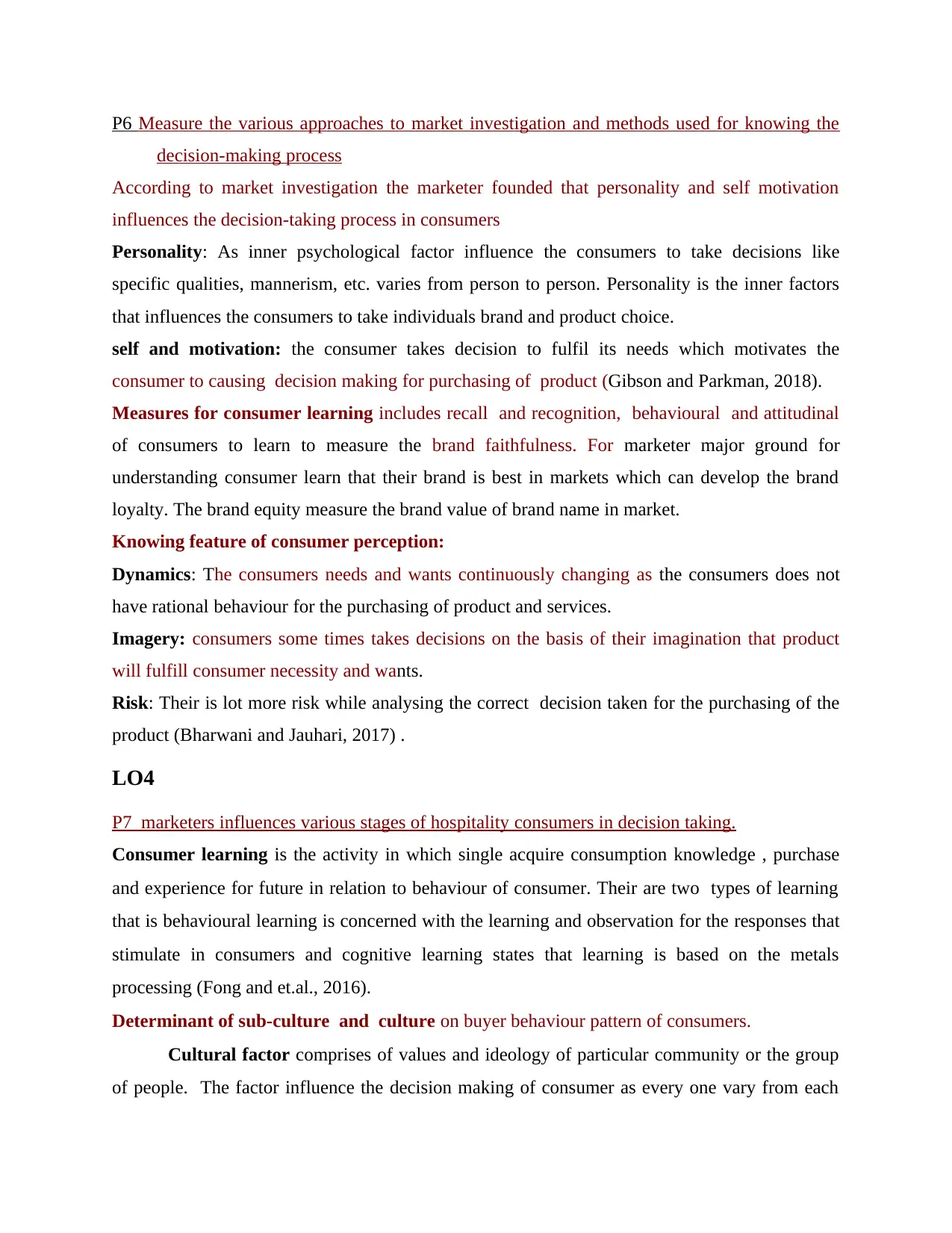
P6 Measure the various approaches to market investigation and methods used for knowing the
decision-making process
According to market investigation the marketer founded that personality and self motivation
influences the decision-taking process in consumers
Personality: As inner psychological factor influence the consumers to take decisions like
specific qualities, mannerism, etc. varies from person to person. Personality is the inner factors
that influences the consumers to take individuals brand and product choice.
self and motivation: the consumer takes decision to fulfil its needs which motivates the
consumer to causing decision making for purchasing of product (Gibson and Parkman, 2018).
Measures for consumer learning includes recall and recognition, behavioural and attitudinal
of consumers to learn to measure the brand faithfulness. For marketer major ground for
understanding consumer learn that their brand is best in markets which can develop the brand
loyalty. The brand equity measure the brand value of brand name in market.
Knowing feature of consumer perception:
Dynamics: The consumers needs and wants continuously changing as the consumers does not
have rational behaviour for the purchasing of product and services.
Imagery: consumers some times takes decisions on the basis of their imagination that product
will fulfill consumer necessity and wants.
Risk: Their is lot more risk while analysing the correct decision taken for the purchasing of the
product (Bharwani and Jauhari, 2017) .
LO4
P7 marketers influences various stages of hospitality consumers in decision taking.
Consumer learning is the activity in which single acquire consumption knowledge , purchase
and experience for future in relation to behaviour of consumer. Their are two types of learning
that is behavioural learning is concerned with the learning and observation for the responses that
stimulate in consumers and cognitive learning states that learning is based on the metals
processing (Fong and et.al., 2016).
Determinant of sub-culture and culture on buyer behaviour pattern of consumers.
Cultural factor comprises of values and ideology of particular community or the group
of people. The factor influence the decision making of consumer as every one vary from each
decision-making process
According to market investigation the marketer founded that personality and self motivation
influences the decision-taking process in consumers
Personality: As inner psychological factor influence the consumers to take decisions like
specific qualities, mannerism, etc. varies from person to person. Personality is the inner factors
that influences the consumers to take individuals brand and product choice.
self and motivation: the consumer takes decision to fulfil its needs which motivates the
consumer to causing decision making for purchasing of product (Gibson and Parkman, 2018).
Measures for consumer learning includes recall and recognition, behavioural and attitudinal
of consumers to learn to measure the brand faithfulness. For marketer major ground for
understanding consumer learn that their brand is best in markets which can develop the brand
loyalty. The brand equity measure the brand value of brand name in market.
Knowing feature of consumer perception:
Dynamics: The consumers needs and wants continuously changing as the consumers does not
have rational behaviour for the purchasing of product and services.
Imagery: consumers some times takes decisions on the basis of their imagination that product
will fulfill consumer necessity and wants.
Risk: Their is lot more risk while analysing the correct decision taken for the purchasing of the
product (Bharwani and Jauhari, 2017) .
LO4
P7 marketers influences various stages of hospitality consumers in decision taking.
Consumer learning is the activity in which single acquire consumption knowledge , purchase
and experience for future in relation to behaviour of consumer. Their are two types of learning
that is behavioural learning is concerned with the learning and observation for the responses that
stimulate in consumers and cognitive learning states that learning is based on the metals
processing (Fong and et.al., 2016).
Determinant of sub-culture and culture on buyer behaviour pattern of consumers.
Cultural factor comprises of values and ideology of particular community or the group
of people. The factor influence the decision making of consumer as every one vary from each
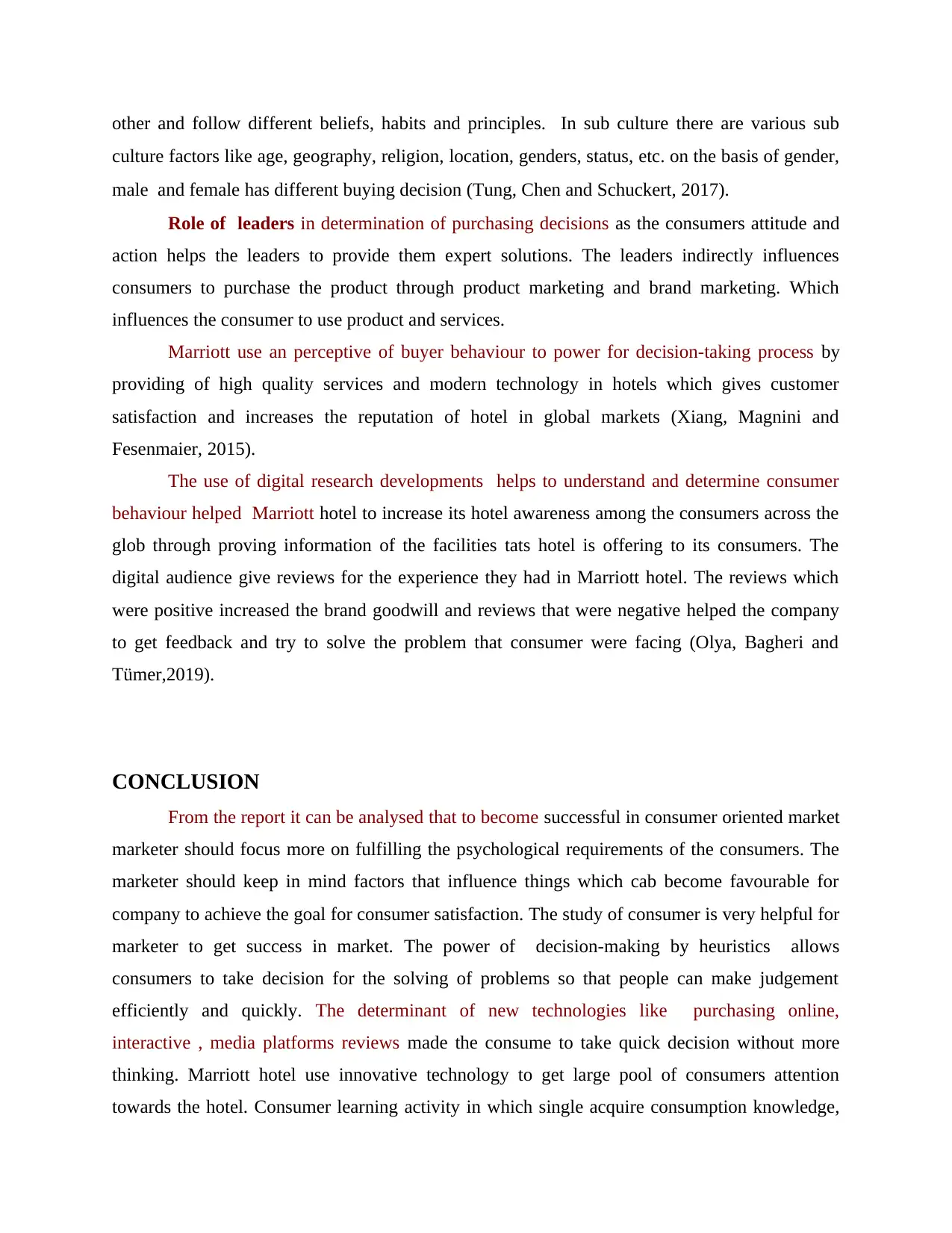
other and follow different beliefs, habits and principles. In sub culture there are various sub
culture factors like age, geography, religion, location, genders, status, etc. on the basis of gender,
male and female has different buying decision (Tung, Chen and Schuckert, 2017).
Role of leaders in determination of purchasing decisions as the consumers attitude and
action helps the leaders to provide them expert solutions. The leaders indirectly influences
consumers to purchase the product through product marketing and brand marketing. Which
influences the consumer to use product and services.
Marriott use an perceptive of buyer behaviour to power for decision-taking process by
providing of high quality services and modern technology in hotels which gives customer
satisfaction and increases the reputation of hotel in global markets (Xiang, Magnini and
Fesenmaier, 2015).
The use of digital research developments helps to understand and determine consumer
behaviour helped Marriott hotel to increase its hotel awareness among the consumers across the
glob through proving information of the facilities tats hotel is offering to its consumers. The
digital audience give reviews for the experience they had in Marriott hotel. The reviews which
were positive increased the brand goodwill and reviews that were negative helped the company
to get feedback and try to solve the problem that consumer were facing (Olya, Bagheri and
Tümer,2019).
CONCLUSION
From the report it can be analysed that to become successful in consumer oriented market
marketer should focus more on fulfilling the psychological requirements of the consumers. The
marketer should keep in mind factors that influence things which cab become favourable for
company to achieve the goal for consumer satisfaction. The study of consumer is very helpful for
marketer to get success in market. The power of decision-making by heuristics allows
consumers to take decision for the solving of problems so that people can make judgement
efficiently and quickly. The determinant of new technologies like purchasing online,
interactive , media platforms reviews made the consume to take quick decision without more
thinking. Marriott hotel use innovative technology to get large pool of consumers attention
towards the hotel. Consumer learning activity in which single acquire consumption knowledge,
culture factors like age, geography, religion, location, genders, status, etc. on the basis of gender,
male and female has different buying decision (Tung, Chen and Schuckert, 2017).
Role of leaders in determination of purchasing decisions as the consumers attitude and
action helps the leaders to provide them expert solutions. The leaders indirectly influences
consumers to purchase the product through product marketing and brand marketing. Which
influences the consumer to use product and services.
Marriott use an perceptive of buyer behaviour to power for decision-taking process by
providing of high quality services and modern technology in hotels which gives customer
satisfaction and increases the reputation of hotel in global markets (Xiang, Magnini and
Fesenmaier, 2015).
The use of digital research developments helps to understand and determine consumer
behaviour helped Marriott hotel to increase its hotel awareness among the consumers across the
glob through proving information of the facilities tats hotel is offering to its consumers. The
digital audience give reviews for the experience they had in Marriott hotel. The reviews which
were positive increased the brand goodwill and reviews that were negative helped the company
to get feedback and try to solve the problem that consumer were facing (Olya, Bagheri and
Tümer,2019).
CONCLUSION
From the report it can be analysed that to become successful in consumer oriented market
marketer should focus more on fulfilling the psychological requirements of the consumers. The
marketer should keep in mind factors that influence things which cab become favourable for
company to achieve the goal for consumer satisfaction. The study of consumer is very helpful for
marketer to get success in market. The power of decision-making by heuristics allows
consumers to take decision for the solving of problems so that people can make judgement
efficiently and quickly. The determinant of new technologies like purchasing online,
interactive , media platforms reviews made the consume to take quick decision without more
thinking. Marriott hotel use innovative technology to get large pool of consumers attention
towards the hotel. Consumer learning activity in which single acquire consumption knowledge,
Paraphrase This Document
Need a fresh take? Get an instant paraphrase of this document with our AI Paraphraser
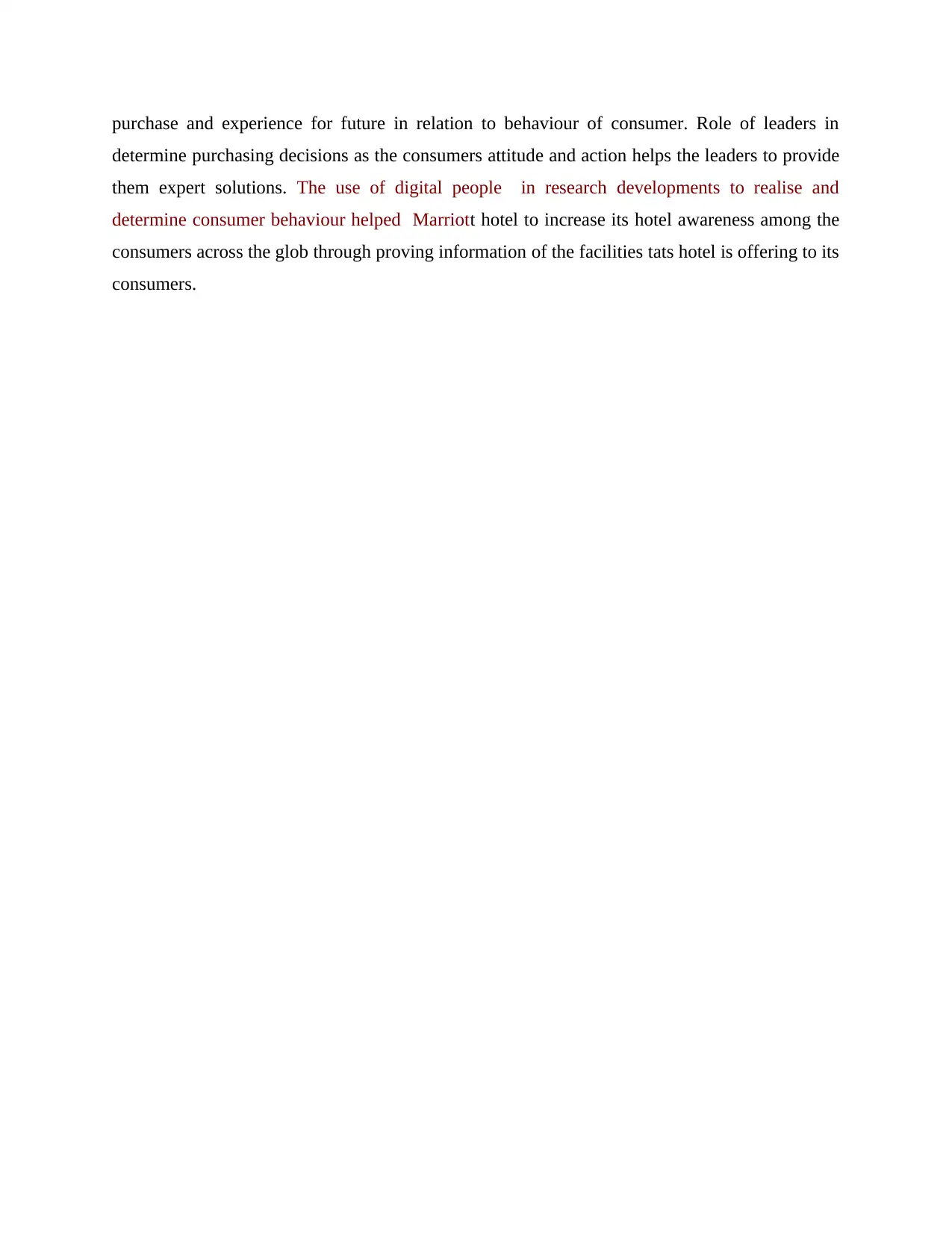
purchase and experience for future in relation to behaviour of consumer. Role of leaders in
determine purchasing decisions as the consumers attitude and action helps the leaders to provide
them expert solutions. The use of digital people in research developments to realise and
determine consumer behaviour helped Marriott hotel to increase its hotel awareness among the
consumers across the glob through proving information of the facilities tats hotel is offering to its
consumers.
determine purchasing decisions as the consumers attitude and action helps the leaders to provide
them expert solutions. The use of digital people in research developments to realise and
determine consumer behaviour helped Marriott hotel to increase its hotel awareness among the
consumers across the glob through proving information of the facilities tats hotel is offering to its
consumers.
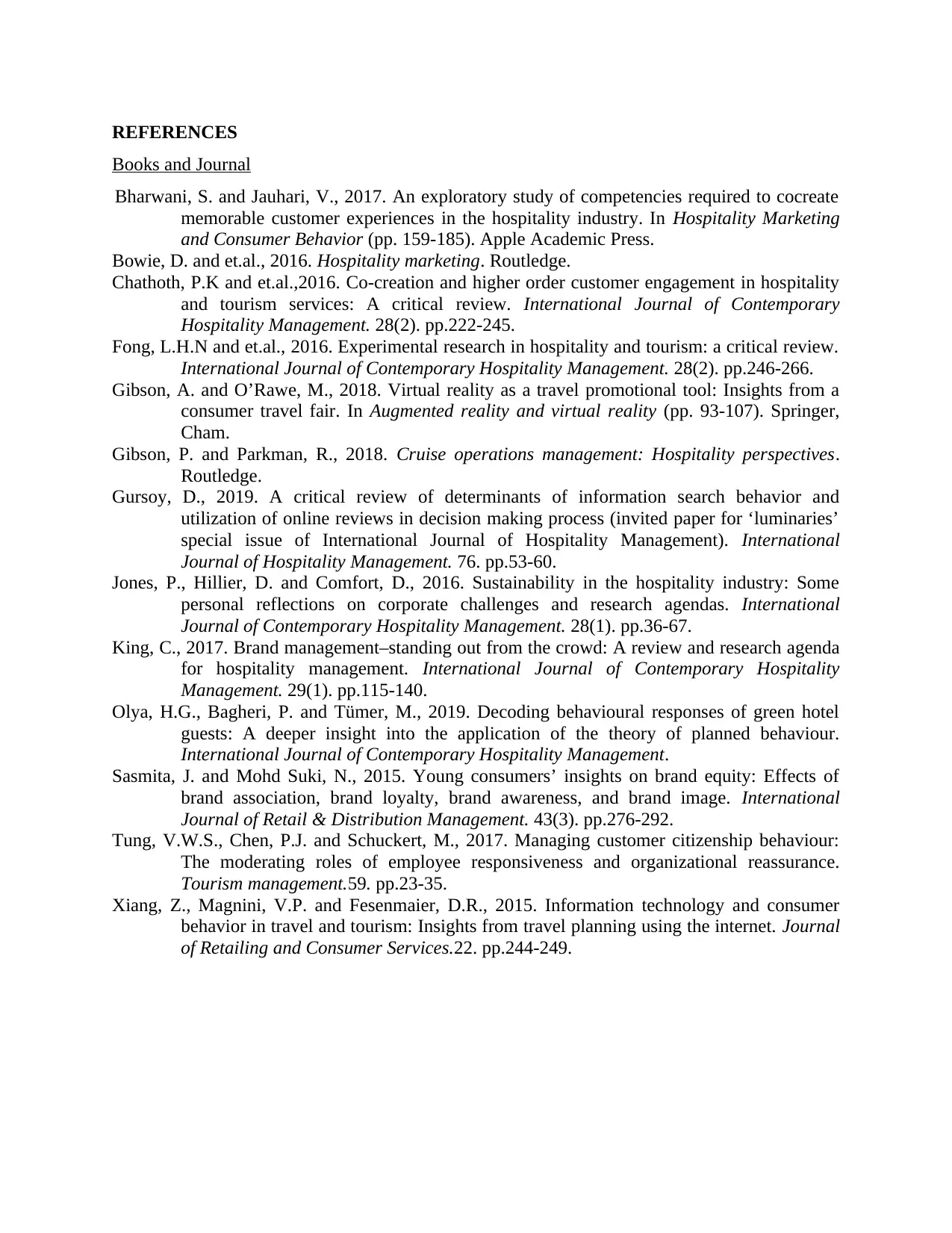
REFERENCES
Books and Journal
Bharwani, S. and Jauhari, V., 2017. An exploratory study of competencies required to cocreate
memorable customer experiences in the hospitality industry. In Hospitality Marketing
and Consumer Behavior (pp. 159-185). Apple Academic Press.
Bowie, D. and et.al., 2016. Hospitality marketing. Routledge.
Chathoth, P.K and et.al.,2016. Co-creation and higher order customer engagement in hospitality
and tourism services: A critical review. International Journal of Contemporary
Hospitality Management. 28(2). pp.222-245.
Fong, L.H.N and et.al., 2016. Experimental research in hospitality and tourism: a critical review.
International Journal of Contemporary Hospitality Management. 28(2). pp.246-266.
Gibson, A. and O’Rawe, M., 2018. Virtual reality as a travel promotional tool: Insights from a
consumer travel fair. In Augmented reality and virtual reality (pp. 93-107). Springer,
Cham.
Gibson, P. and Parkman, R., 2018. Cruise operations management: Hospitality perspectives.
Routledge.
Gursoy, D., 2019. A critical review of determinants of information search behavior and
utilization of online reviews in decision making process (invited paper for ‘luminaries’
special issue of International Journal of Hospitality Management). International
Journal of Hospitality Management. 76. pp.53-60.
Jones, P., Hillier, D. and Comfort, D., 2016. Sustainability in the hospitality industry: Some
personal reflections on corporate challenges and research agendas. International
Journal of Contemporary Hospitality Management. 28(1). pp.36-67.
King, C., 2017. Brand management–standing out from the crowd: A review and research agenda
for hospitality management. International Journal of Contemporary Hospitality
Management. 29(1). pp.115-140.
Olya, H.G., Bagheri, P. and Tümer, M., 2019. Decoding behavioural responses of green hotel
guests: A deeper insight into the application of the theory of planned behaviour.
International Journal of Contemporary Hospitality Management.
Sasmita, J. and Mohd Suki, N., 2015. Young consumers’ insights on brand equity: Effects of
brand association, brand loyalty, brand awareness, and brand image. International
Journal of Retail & Distribution Management. 43(3). pp.276-292.
Tung, V.W.S., Chen, P.J. and Schuckert, M., 2017. Managing customer citizenship behaviour:
The moderating roles of employee responsiveness and organizational reassurance.
Tourism management.59. pp.23-35.
Xiang, Z., Magnini, V.P. and Fesenmaier, D.R., 2015. Information technology and consumer
behavior in travel and tourism: Insights from travel planning using the internet. Journal
of Retailing and Consumer Services.22. pp.244-249.
Books and Journal
Bharwani, S. and Jauhari, V., 2017. An exploratory study of competencies required to cocreate
memorable customer experiences in the hospitality industry. In Hospitality Marketing
and Consumer Behavior (pp. 159-185). Apple Academic Press.
Bowie, D. and et.al., 2016. Hospitality marketing. Routledge.
Chathoth, P.K and et.al.,2016. Co-creation and higher order customer engagement in hospitality
and tourism services: A critical review. International Journal of Contemporary
Hospitality Management. 28(2). pp.222-245.
Fong, L.H.N and et.al., 2016. Experimental research in hospitality and tourism: a critical review.
International Journal of Contemporary Hospitality Management. 28(2). pp.246-266.
Gibson, A. and O’Rawe, M., 2018. Virtual reality as a travel promotional tool: Insights from a
consumer travel fair. In Augmented reality and virtual reality (pp. 93-107). Springer,
Cham.
Gibson, P. and Parkman, R., 2018. Cruise operations management: Hospitality perspectives.
Routledge.
Gursoy, D., 2019. A critical review of determinants of information search behavior and
utilization of online reviews in decision making process (invited paper for ‘luminaries’
special issue of International Journal of Hospitality Management). International
Journal of Hospitality Management. 76. pp.53-60.
Jones, P., Hillier, D. and Comfort, D., 2016. Sustainability in the hospitality industry: Some
personal reflections on corporate challenges and research agendas. International
Journal of Contemporary Hospitality Management. 28(1). pp.36-67.
King, C., 2017. Brand management–standing out from the crowd: A review and research agenda
for hospitality management. International Journal of Contemporary Hospitality
Management. 29(1). pp.115-140.
Olya, H.G., Bagheri, P. and Tümer, M., 2019. Decoding behavioural responses of green hotel
guests: A deeper insight into the application of the theory of planned behaviour.
International Journal of Contemporary Hospitality Management.
Sasmita, J. and Mohd Suki, N., 2015. Young consumers’ insights on brand equity: Effects of
brand association, brand loyalty, brand awareness, and brand image. International
Journal of Retail & Distribution Management. 43(3). pp.276-292.
Tung, V.W.S., Chen, P.J. and Schuckert, M., 2017. Managing customer citizenship behaviour:
The moderating roles of employee responsiveness and organizational reassurance.
Tourism management.59. pp.23-35.
Xiang, Z., Magnini, V.P. and Fesenmaier, D.R., 2015. Information technology and consumer
behavior in travel and tourism: Insights from travel planning using the internet. Journal
of Retailing and Consumer Services.22. pp.244-249.
1 out of 9
Related Documents
Your All-in-One AI-Powered Toolkit for Academic Success.
+13062052269
info@desklib.com
Available 24*7 on WhatsApp / Email
![[object Object]](/_next/static/media/star-bottom.7253800d.svg)
Unlock your academic potential
© 2024 | Zucol Services PVT LTD | All rights reserved.



